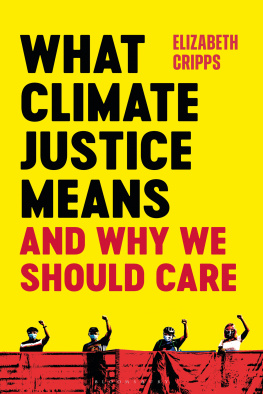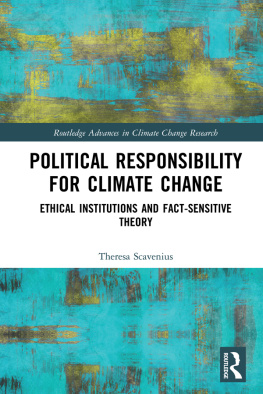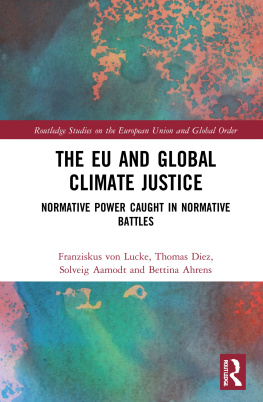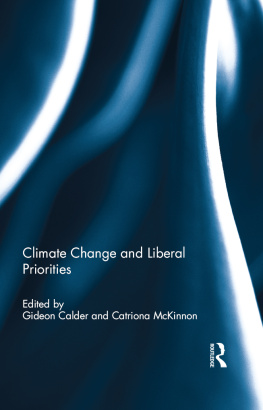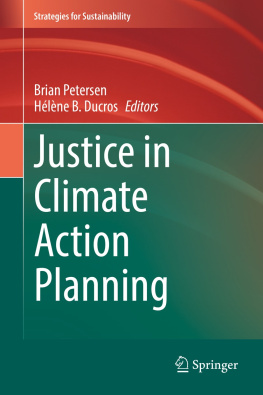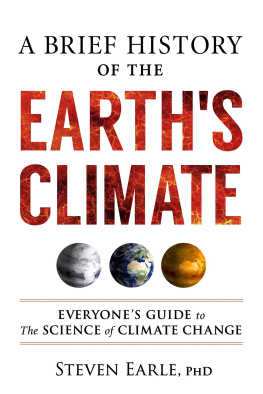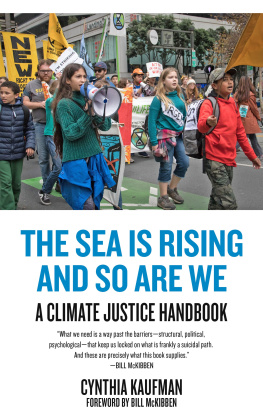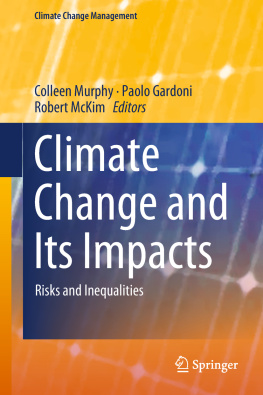An insightful and timely book that shows that climate justice is essential if we are to deal with climate change. The book forces us to acknowledge that those who have contributed least to greenhouse gas emissions are the most affected by the impacts of the climate crisis. This compelling book opens up the ethical and moral discussions of who is to blame and who should pay to deal with climate change.
Professor Mark Maslin, author of How To Save Our Planet
Why is climate change really about ethics and justice? Why isnt it just science, technology and politics? Cripps cuts to the heart of the matter, and in doing so risks breaking ours. Hauntingly clear, passionate, and unflinching. A powerful rebuke to those who want to deny the reality of climate injustice, and an uncomfortable, but stirring call to action for the rest of us.
Professor Stephen Gardiner, author of A Perfect Moral Storm: The Ethical Tragedy of Climate Change
Its about time someone gave us an accessible explanation of climate justice and why it must be integral to climate action. I thoroughly recommend Elizabeth Cripps excellent book as a resource for students, activists, policy-makers and everyone else who wants to make a well-reasoned case for a just transition to a more sustainable world.
Dr Sherilyn MacGregor, Reader in Environmental Politics, University of Manchester
This book is a short and direct conversation with a philosopher carefully thinking through our duties now toward other people given the scary changes we all may face. While it may be painful reading at times, you will gain insights not available in any other book about climate change. The subtle analysis does not stifle the passion, and the deep feeling does not cloud the arguments. A moving philosophical plea for immediate radical action with the reasons distilled to their essence. If you wonder where to begin to tackle the worsening climate, start here.
Professor Henry Shue, Merton College, Oxford. Senior Research Fellow, Centre for International Studies, DPIR
What Climate Justice Means And Why We Should Care is a compelling read and does a fantastic job at engaging a non-academic audience to envision the severity of the climate crisis. Through real-world illustrations and anecdotes, the book offers a concise overview of the complexities and moral dilemmas of addressing climate injustice in the twenty-first century. Elizabeth Cripps stresses the importance of oppressions and discriminations based on social categories such as gender, race and class, and goes a step further to introduce the concept of multi-species justice which is often sidelined in discussions about climate justice. This book compels readers to think critically about injustice and the false dichotomy between individual and collective action.
Pooja Kishinani, climate activist and co-author of The Student Guide to the Climate Crisis
The iron law of global warming is: the less you did to cause it, the sooner and harder you suffer its effects. As this book makes clear, that raises very deep questions about justice, which we will be grappling with for the forseeable future. If you read this, youll have a good head start on a crucial debate.
Bill McKibben, author of Falter: Has the Human Game Begun to Play Itself Out?
We live in a world increasingly impacted not only by climate change, but also its unjust impacts on both human and nonhuman communities. Elizabeth Cripps offers a lucid, comprehensive, and pertinent overview of a range of ideas and realities of climate justice in all its complexity. She offers the crucial argument that, in everyday political and personal practice, climate change is a choice to violate the rights of the most vulnerable. As inequitable as climate change can be, Cripps insists that it is possible, and straightforward, to choose climate justice instead.
David Schlosberg, Professor of Environmental Politics and Director, Sydney Environment Institute, University of Sydney
An essential primer. Elizabeth Cripps deftly explains the complexity of wicked problems without ever losing sight of the fundamental truth that, before it is a technical or political issue, climate injustice is a moral one.
Professor David Farrier, author of Footprints: In Search of Future Fossils
The concept of climate justice is increasingly being invoked. But what is climate justice? In her brilliant book, Elizabeth Cripps gives us a definitive answer. What Climate Justice Means shows why climate change is a matter of justice, who bears responsibility for this and what citizens and governments ought to do. It vividly conveys the realities of climate injustices and makes a compelling moral case for action.
Simon Caney, Professor of Political Theory, University of Warwick
For my family,
with love and hope

Contents
Imagine this. You and your partner and baby, rowing through foul water on an inflatable mattress you begged from a stranger. Your home and possessions submerged. Driven by fear from one refuge, where looters reigned and you saw a child die. You drift on your makeshift raft, past floating bodies, through the city that was once your home.
Or this. Another life, already precarious. A bamboo house, a village perched between jungle and sea. Another so-called act of God. Your village is flooded, the salty water undrinkable. There was a fence between your community and wild animals, but the cyclone destroyed that too. You wait, knowing that a tiger could reach you and your family in five minutes. At any time.
Or this. Half a life, drought-wracked, scratched out on land made barren by heatwave after heatwave. Subsistence farming where there is no subsistence, where barely anything will grow and pests or disease strip what little there is. Escaping, if you can, only to another kind of poverty: violence, disease and choking pollution, on the fringes of a city already packed with desperate people. Or staying put, to starve.
For a moment, try to put yourself in these situations. Pick one. Close your eyes. Picture it. Your child, hanging on the edge of drowning. Your elderly mother, unable to run from a tiger. Your farmland arid, your family without water. Think of the choices you would face, the risks you could not avoid, the pain of hunger, of cold, of heat, of not being able to protect those you love the most.
Now step back. Be yourself again. But be yourself knowing that there are people living and dying like this, and there will be many, many more. Remind yourself that you are human and so are they. Ask yourself what that means.
For these are not a philosophers thought experiments, plucked out of the air. The first is the story of a New Orleans delivery man, identified only as Andr, in the aftermath of Hurricane Katrina in 2005. He told it later, almost in passing, to journalist Jim Gabour. The second was reported by photojournalist Fabeha Monir, who travelled to southern Bangladesh in the wake of Cyclone Bulbul in 2019. The third is based on the future predicted by the Intergovernmental Panel on Climate Change (IPCC), for countless African families. For many, its already here.
This is what climate injustice looks like.
Im not trying to make you feel guilty. Your guilt wont help, any more than mine will. But I want you to feel something . Because acknowledging the bleak reality of climate injustice is a first step towards recognizing our urgent responsibility to challenge it: to strive, instead, for justice.
We can no longer dismiss these extreme weather events storms, floods, droughts as natural disasters. Perhaps we cannot say with 100 per cent accuracy that climate change caused Hurricane Katrina or Cyclone Bulbul. But we know that events like these happen more often, and are more destructive, in our warming world, and that they will go on getting worse. We know that climate change causes disease and wildfires, decimates livelihoods. Of course, its not your fault or my fault, individually, that this is happening. But its happening because of the actions of governments of wealthy countries, multinational corporations and, in combination, people like you and me. Between us, we could change this.

